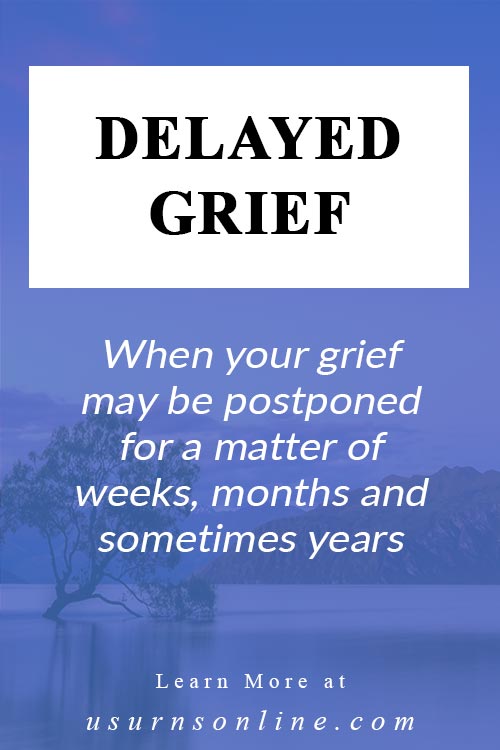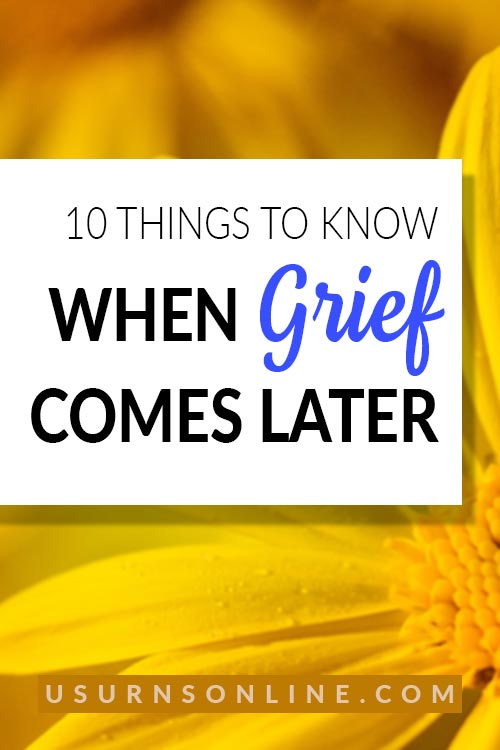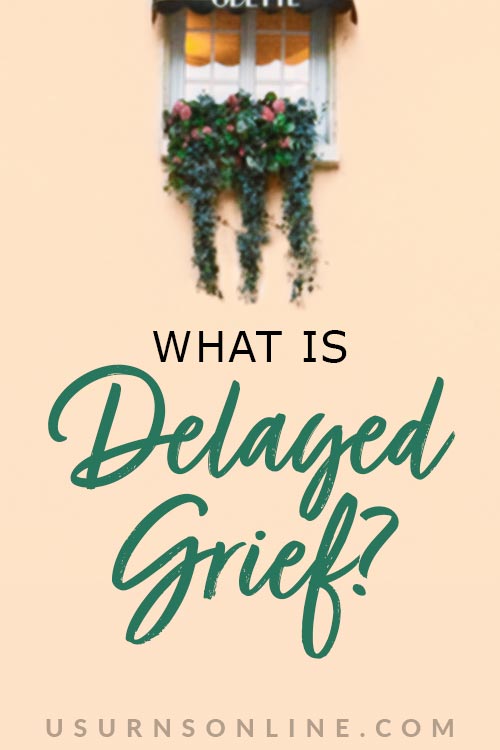Grief can take on many forms. If you aren’t fully experiencing grief after your loss, this could signify delayed grief.
Why does delayed grief happen? What are the symptoms? Should you seek professional help if you suffer from delayed grief?
The grieving process allows you to heal. It’s a journey we will all have to work through at one time or another. Please continue reading and learning what you need to know about delayed grief and how to work through it.
Delayed Grief Definition
Delayed grief is a suspended form of grief that can happen for any number of reasons. It is fairly common and a completely normal reaction after losing someone, especially when that loss causes new responsibilities to fall on your shoulders.
However, despite it being common or “normal,” it is still a form of complicated grief and may cause physical or emotional side effects.
Many people set aside their initial deep grief and work through what needs to be done. This might include funeral arrangements, dealing with the decedent’s estate, taking care of children, even moving. Once things settle down, you have time to grieve properly.

When does delayed grief show up?
People can keep grief at bay if more than one “big” episode happens at once.
An example might be when a divorce and a parent’s death occurs at the same time. The grief you feel is put on hold because you are processing your divorce. Once the divorce is finalized and you’ve had time to adjust, that’s when the grief from your mom dying may show up.
Or it might happen the other way around – you grieve the loss of you mom in the midst of the divorce proceedings. You feel like you’re handling the divorce pretty well while also mourning properly for your parent. Then later, once the initial waves of grief reside, the funeral is over, and the divorce is finalized, you may find yourself processing the end of your relationship and experience a fresh round of grief. Don’t be surprised if this happens to you; it is completely normal.
Just be away that delayed grief can show up weeks, months, or even years after the loss has occurred.
Urns Made in the USA
Related: How Long Does Grief Last?
What causes delayed grief?
You may not grieve immediately following a death or loss. Everyone experiences grief differently.
Delayed grief may be caused by:
- Death of a loved one.
- Ending a romantic relationship.
- Losing a beloved pet.
- Loss of a personal dream.
- Ending a friendship.
- Loss of a job.
What is the difference between delayed grief and unresolved grief?
Unresolved grief is described as grief that does not go away or interfere with the person’s ability to take care of daily responsibilities. Delayed grief is just that – delayed by other episodes that you have to deal with.
The difference is that with unresolved grief, addressing the loss is a priority but something always prevents you from doing so, either by choice or by circumstance. Delayed grief sets the grief aside for a time as you deal with things that are temporarily more pressing.
Unresolved grief is often unhealthy because the priority should be grieving but you avoid it. Delayed grief can be difficult but is sometimes necessary because other things are more pressing and as humans our time and our emotional resources are limited.
Read more: 10 Things to Know About Inhibited or Unresolved Grief.
Delayed Grief Symptoms
- Sleeplessness
- Headaches
- Aches and pains
- Irritability
- Mood swings
- Sadness
- Guilt
- Anger
- No appetite or excessive appetite
- Excessive crying
- Feeling listless or feeling manic
10 Things to Know About Delayed Grief
1. Delayed grief can cause physical problems.
You may develop:
- High blood pressure
- Stomach problems
- Heart palpitations
- Lowered immunity
- Forgetfulness
- Confusion
2. How long does it take delayed grief to manifest?
It can be confusing, but delayed grief can take years to show up. You may have suffered a loss in childhood that doesn’t show up until you are an adult.
A few weeks after the funeral, grief may show up once life starts to “settle down” again. Or it could take months for your emotions to show over the grief of losing someone dear to you.
3. Risk factors for delayed grief.
You may be likely to experience delayed grief with any of the following:
- Death of a child.
- An unexpected or violent death.
- Traumatic childhood experiences.
- History of depression, post-traumatic stress disorder, or separation anxiety.
- Close relationship to the deceased person.
- Other major life stressors, such as significant financial hardships
4. What are the risk factors of complicated grief?
Delayed grief is a form of complicated grief.
- The cause of death.
- The grieving person’s age and gender.
- The grieving person’s customs and religious or spiritual beliefs.
- The support available from friends and family.
- The relationship a grieving person had with the person who died.
- The life history of the person who is grieving, including past experiences with loss.
5. Death isn’t the only loss to cause delayed grief.
What else can cause you to suffer from delayed grief? The loss of one or more of the following:
- Job
- Friendship
- Marriage or relationship
- Home
- Pet
- Any loss that can bring on grief
6. Avoid “unhealthy” coping tactics.
It’s ok to delay proper grief for a time as you deal with other pressing matters. Still, your mind and body may want to express the grief in some way. So please don’t cope with:
- Overeating or comfort eating
- Drinking excessively
- Drugs
- Driving recklessly
- Chewing your nails
- Negative “self-talk”
- Aggression
7. Delayed grief is normal.
Delayed grief is completely normal. This delay in your feelings of intense grief and thoughts is your brain’s way of sheltering you. It helps you to be able to complete the tasks at hand. Things like planning the funeral, taking care of your kids and family,
8. What are examples of reactions to delayed grief?
During the time that the grief is “delayed,” your emotions are still trying to process it in some way. This might lead to some surprising reactions such as:
- Crying or uncontrolled sobbing
- Intense yearning for the deceased
- Bouts of distress
- Short bursts of hysterical laughter
- Unexplained and extreme anger
- Preoccupation with thoughts about the loved one
- Restlessness
- Insomnia
- Feelings of hopelessness
9. How to cope positively with delayed grief
It may be difficult to begin to engage with your grief as you deal with so many other things at this time. Still, you should try to find healthy, positive ways to cope with the loss.
- Express your emotions
- Preserve and share your memories
- Join a support group
- Talk about your loved one when possible
- Take care of yourself
- Journal your feelings and thoughts
10. How can you prevent delayed grief?
Again, while there are times that it may be necessary to set aside the pain and sorrow of loss, you will still need to address it at some point. We recommend that you find productive, healthy ways to process as soon as possible.
This might include:
- Bereavement counseling. With counseling, you can explore emotions surrounding your loss and learn healthy ways to deal with your grief.
- Talking. Talking about grief and allowing yourself to mourn can help prevent you from getting mired in your grief.
- Support. Friends, family members, support groups, and your church can help you work through your grief.
Please check out our tips on how to grieve well for more help.
Types of Grief
There isn’t just one type of grief. Depending on the model you are looking at, there are somewhere between eight and sixteen types of grief. Here are a few prominent types:
- Anticipatory Grief. If you know someone who has a terminal disease, you may start to grieve before they pass away.
- Complicated Grief. Your pain may be so overwhelming that it prevents you from going about your daily life.
- Normal Grief. You can carry on with your everyday life and grieve at the same time. It doesn’t mean you aren’t affected; you are moving forward and working through your grief.
- Inhibited Grief. You don’t show any typical signs of grief.
- Disenfranchised Grief. When you experience a loss, and others do not acknowledge the importance of the loss in your life. An example is the loss of a beloved pet or the loss of a lover from an extra-marital affair.
- Exaggerated Grief. Your feelings are intensified and get worse over time.
- Absent Grief. You don’t acknowledge the loss of a loved one and show no signs of grief.
- Delayed Grief. Your reactions and emotions to death are postponed until a later time.
- Prolonged Grief. When normal grief lasts for 12 months or longer.
Grief has no set timeline and shouldn’t be rushed. Work through your grieving at your own pace. Treat yourself well and be healthy!
Read next: The 16 Ways People Grieve
Pin It




